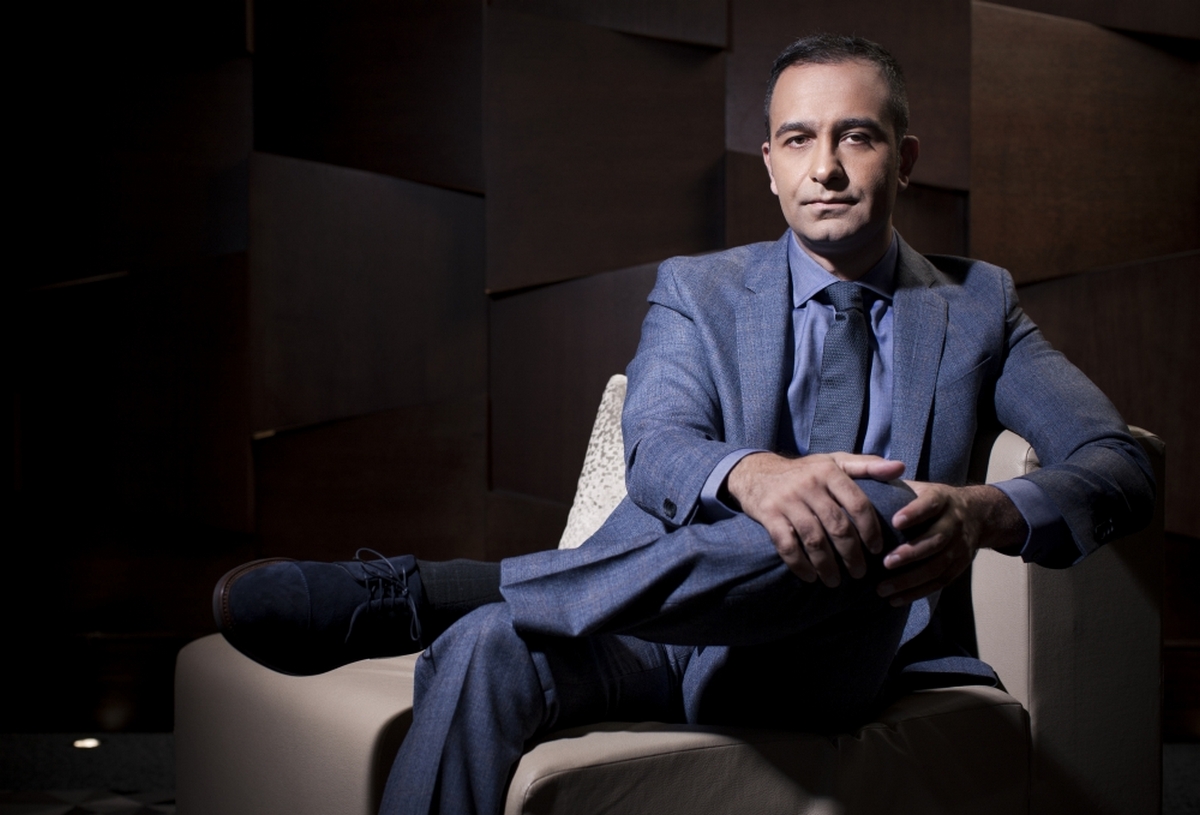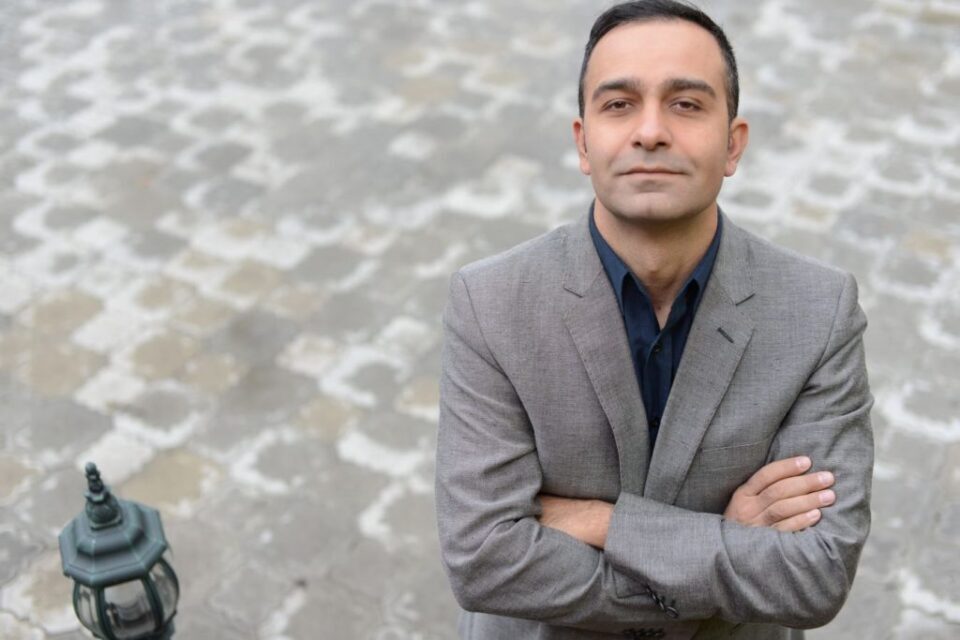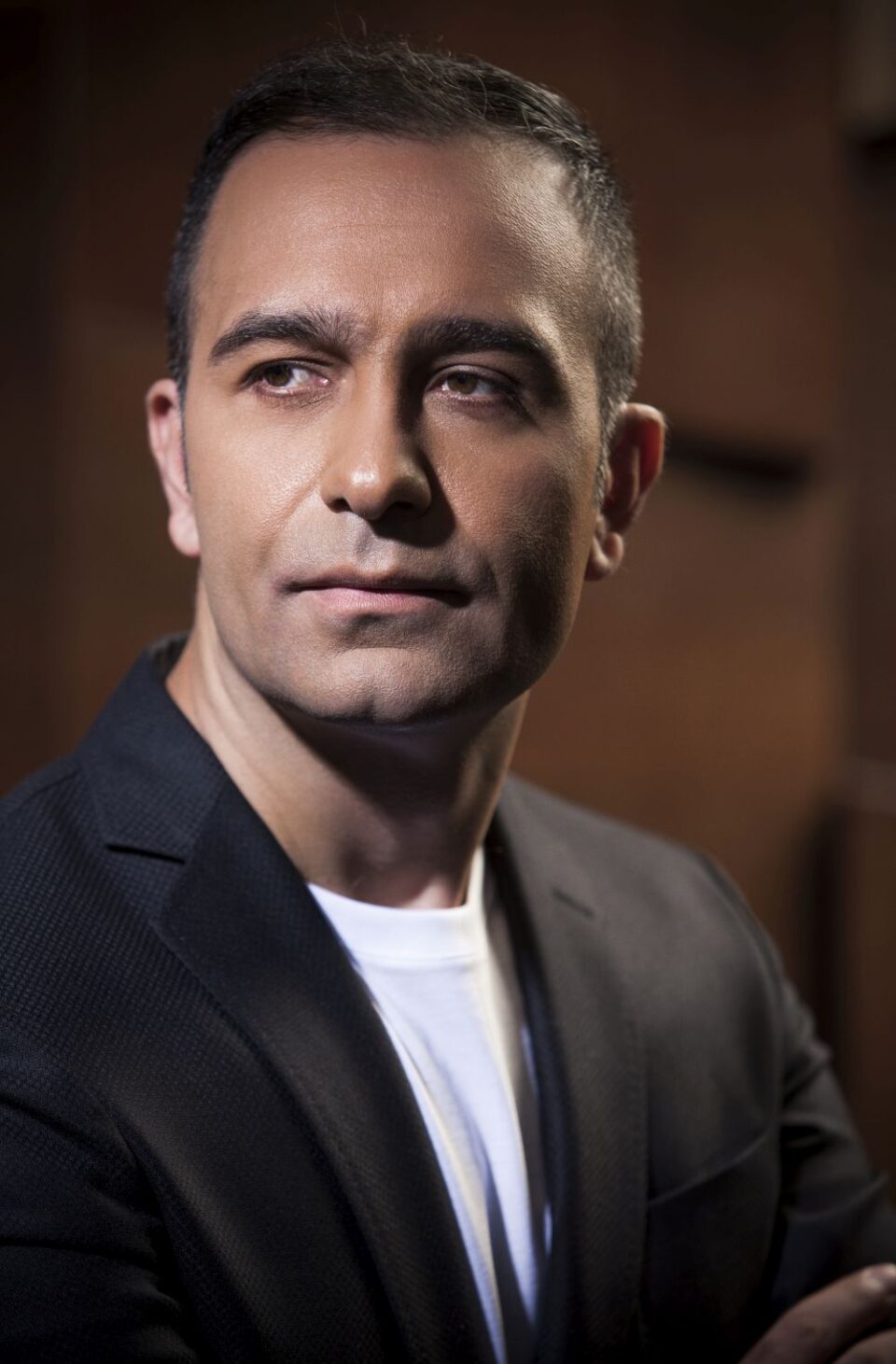As the newly appointed ‘composer in residence’ at The Ilija M. Kolarac Endowment, Mr Simić narrates his unique journey from medical student to renowned composer and social activist, discusses his creative process and shares his unwavering commitment to positive social change through music

Mr. Simić, would you care to describe and share some of your earliest memories, related to music? How did your love for music begin to develop?
I wish I had a super cool answer to that question. Some deep inner trauma, like the Frère Jacques melody, heard by the pubescent Gustav Mahler, moments after he was sexually assaulted, and later masterfully incorporated into his First Symphony in a form of a marche funèbre; or the tunes of two separate country fair bands, turned into a single piece of classical music and transformed by the pen of Charles Ives into two autonomous symphony orchestras within one ensemble, drawing on the experience of the fact that his childhood farm was situated in the middle of nothing, and mathematically equidistant from the two nearest dwellings, whose sounds, although miles away, reached his home at the exact same time.
As for my earliest personal memories – I think that they are much more closely connected to images or scents, rather than to what remained deposited as an aural sensation. The fireworks of mud, dug by the galloping hooves, seen through a hole in a horse carriage on our farm near Bremen, or the smell of putrid fish and fruit on a Singaporean open green market in the middle of the monsoon season. Come to think of it, if I stop and ponder over the essence of your question, I think this is probably very audible in my music. People often tell me that a certain piece evokes strong and vivid images; the kind which they can not immediately decipher. That it brings them back to a certain period in their lives, that they have, for some reason, completely repressed and shut out, and that it does it in a way an unexpected sight or a long forgotten scent often trigger.
The path of your career in music is an unusual one, having in mind that you’ve shifted towards music in the middle of your med school studies. How exactly did you reach this decision and how did it affect your career?
It is a well known fact that I’ve picked up music fairly late in my life. I was, what you can call, a musical illiterate. I couldn’t read notes; couldn’t carry a tune (to save my life); couldn’t play an instrument, nor have I ever attempted to play one. And then, for essentially very stupid, trivial and unintended reasons, which I will go into at this point, it all turned around overnight and went to the opposite extreme, some two or three weeks before my fifteenth birthday. In a way, I’ve fallen of a horse, on my way to Damascus, and this voracious fascination with music, which constantly calls me to seek it out and discover it from as many angles as possible, coupled with the idea that I am irreparably and fatally late in the race, is what still defines my relationship with it. I’m sure that if everything went “by timetable”, it would have been completely different. This way, I assume that my crippled beginnings served their cause, the same way that the famous short stature did with Napoleon. It is sometimes good and healthy to have inferiority complexes, if you know how to bridle them and move forward.
In a way, I’ve fallen off a horse, on my way to Damascus, and this voracious fascination with music, which constantly calls me to seek it out and discover it from as many angles as possible, coupled with the idea that I am irreparably and fatally late in the race, is what still defines my relationship with it
How did you get to start your “Seraphim” ensemble, and what was your goal with this project?
At one point I just realized that I’ve been playing so often with some five or six of my colleagues, working on rehearsing and performing my music, that in a certain way we were already a kind of a band, although a nameless one. Besides me, at the keys, there was also a violin, a cello, a clarinet, a voice and percussion. A great combination of timbres – and thanks to that, actually an ensemble that in certain situations and arrangements has the capacity of sounding like a small orchestra. Back in 2005, when I finally named us “Aleksandar Simić & The Seraphim”, we published two full CDs and two DVDs, with music videos that were broadcasted on some ten different TV stations in the country for thousands and thousands of times, during the period of some two or three years. In those days, both the quality of the programs on TV and the ratings were on a complete different level. We signed a contract with the National Theatre in Belgrade and staged an incredibly dynamic multimedia program, which entailed super attractive sets, choreographies, a large choir and video-installations, hand-tailored to each and every piece in the program. The music was, stylistically and genre-wise fantastically eclectic, which resulted in a highly versatile program, and this enabled us to regularly program the “Seraphim” into the calendar of the Theatre, rather than doing a one-off performance. Anyway, already in 2006, I started booking the Seraphim for concerts outside Serbia. The first one was scheduled for New York, and all seemed perfect, until I realized that I can sadly not rely on my Belgrade crew, and decided that it is safer, and also much cheaper for the overseas venues and organizers, to make an impromptu and ‘in situ” version of the ensemble, using the local musicians. It quickly became obvious that it was essentially a very good recipe, and then I just stuck to it, creating more or less temporary (but also sometimes long-running) ensembles in places like St. Petersburg, Turin, Lisbon, Hamburg or Delhi.
Your opus comprises of works commissioned from various parts of the world, including Russia and the Vatican. How did it come to this and can you remember what your initial reactions were?
The life I lived with my parents, was, from my earliest days scattered across many different places. When I got professionally engaged with music, there were many places that I have, at least at some point, already considered home – albeit a temporary one. Of course, one should bear in mind that each and every of these places is a separate universe in itself and completely unique when it comes to the people, the society as such, the musical institutions and ensembles and especially the rapport I’ve had and still have with the specific city. You’re mentioning the Vatican and I can tell you that Aleksandar Simić from the left bank of the Tiber is a completely different person than the Simić from the right bank. The same goes for Moscow and St. Petersburg or for Belgrade and Novi Sad. Even the cities are, in a way, conglomerates of different entities, and you can just imagine how much it applies to what we call countries and nations. My collaboration with the Vatican, and the large volume of music which resulted from this relationship, are both a result of my dedication to inter-religious dialogue, dating all the way back from the early nineties and the fall of Yugoslavia, when denominational differences of the constitutive nations were harshly abused by the warmongering national leaders of Serbia, Croatia and Bosnia. The huge amount of time spent in advocating empathy, better understanding of different circumstances, actual sustainability of viable solutions on the ground, solidarity, responsibility and accountability, which we were in dire need of, while interacting with leaders, both religious and secular, across the globe, has placed me in situations where I would also get commissions for new music. At times, these commissions even felt as a kind of a test, to see if I was committed all the way through, and ready to back my initiatives with my art, as a kind of a “WilliamTell-ian arrow”, handed to me, dipped into the serum of truth.

Your music has the tendency to deal with “larger than life” thematic, such as the inter-religious dialogue and important historic events. How do you approach these themes as a composer?
Responsibly, I hope; and aware of the fact that often times it can be a unique opportunity, not only to express your own opinion, but also to plant a kind of a “bona fide cuckoo egg”. If an institution, such as the United Nations, or the Holy See, or say, Yad Vashem, stands behind what you have created, then also the message that you were trying to articulate and convey, becomes, at least a little bit, a part of the official policy of that very institution. This is why, for example, I was genuinely proud and satisfied, when the Pontifical Committee for Liturgical Celebrations allowed and approved the new additions to the texts of the Proprium in my Missa Solemnior – the work written to commemorate 950 years of the schism and 40 years of (insufficient) reconciliation between Rome and Constantinople – the texts such as Quid Fecisti, which, through referring to the biblical episode about Cain and Abel, condemns any murder as fratricide, or the Kaddish for Jesus, which gives a huge boost to the Nostra Aetate mission, by condemning anti-Semitism, which was, for the nearly two millennia, either quietly or very loudly, nurtured at the heart of the Christian Church.
You perform at a large number of manifestations, concerts and events. How do you keep the balance between the need to create new music and the responsibility of performing?
It does not necessarily require an effort; maybe just a good sense of time distribution. Honestly, I’m pretty sure that I would find performing dull, if it was just performing – or composing, if there wasn’t a chance to showcase and share this music with fellow musicians. This way my cake has both the sponge and the cream – in perfect ratio.

Still, you manage to find time for a large number of charity concerts. Your “Notes from the Heart” initiative for free cultural programs dedicated to the old, the poor and the handicapped is now over a decade old. What can you tell us about that?
I began doing this, almost by accident, with two concerts for children with Down syndrome. At the very onset of this initiative, it was clear that by promoting and organizing this kind of concerts, we can accomplish multiple goals. Our first goal, and the essential one, was to bring joy to our audiences, and fill their otherwise grim and dreary days with events they will remember and know we are there for them, whenever they feel we should come back and perform for them again. Besides musicians, we would bring clowns and magicians, famous actors and ballet dancers – and sometimes even small farm animals. Our second goal was to use the fact that the artist and cultural institutions (that came up with venues for meetings with our audiences) both provided their services pro bono , and that this gave us an excuse to seek out corporate sponsors and get them to provide all kinds of valuable and beautiful gifts that our guests can take home with them after the show, as a reminder that we all sincerely care for them. The third and the most important one was to use the publicity which these kind of events would receive, and channel this into a kind of gentle but stubborn pressure on the institutions, which were mandated to deal with the life-defining problems of our audiences – such as the Ministries of Health, Social Affairs, Youth and Sports, or various important parliamentary committees. That’s how we realized we can help not just our friends dealing with Down syndrome, but also autism, juvenile cancer, people who spend their lives in wheel-chairs, the blind, the homeless, the old or the refugees, to name only some. When you become aware of the amount of joy you are able to give and receive through this kind of events, and the fact that you can actually make a change in this world, which is otherwise so often ran by status quo, it becomes very hard to give up and quit.
How did you come up with the idea for the “Musical Road-trips” and how do you assess its impact on young people in Serbia?
Some ten years ago, I approached Jeunesses Musicales with an idea to host the young people from various elementary and secondary schools in a series of concerts aimed at mercilessly demolishing the preconceived notion that classical music is boring, stiff or inhospitable. I trusted that by opening a window for noble and beautiful music, we are simultaneously crack-opening, even if just a tad, the door for beauty in their lives – the beauty that is so often seen as weakness and wimpiness these days. Knowing that road-trips are the favorite part of being in school for most kids, we took these programs, packed with exciting multimedia content, fantastic lighting, wonderful dancers and talented musicians and created the concept of a great voyage through various geographical musical idioms. In these ten years, a huge number of young people went through our programs and the reactions are genuinely encouraging. I was pretty sure that we’ll have a hard time keeping their attention alive and awake, considering how often these generations suffer from chronic attention deficit, but they proved us wrong. Lots of it depends on what you have to offer and the manner in which you approach them, and I can say that this entire humongous project has been a great lesson for me as well – a lesson which demands commitment in the battle for the souls of future generations.
When you become aware of the amount of joy you are able to give and receive through this kind of events, and the fact that you can actually make a change in this world, which is otherwise so often ran by status quo, it becomes very hard to give up and quit
How do you feel when you see young artists performing your works and what kind of influence and effect do you think your music has on them?
Well, it depends on the artists. There are some that I hate from the bottom of my guts, for being so much better than me. All jokes aside, there are so many incredibly talented children in the world today. They make you pause and wonder saying “wait a second…where was I at their age…was I able to tie my shoelaces or even properly wipe my nose?!” …and here they are, demolishing their instruments at the age of five or six…or ten. Of course, not all young musicians are wunderkinds, and that’s great. As for young musicians and my music – I don’t know – I am rarely completely satisfied by how people in general, regardless of their age, perform and interpret my music. Maybe some two percent of them play everything the way I imagined it, bringing also themselves into the equation, together with heaps of creativity, emotions and virtuosity. It is because of these people that writing music makes sense. It is with them that it sounds exactly how you imagined it, on million different levels, and becomes the music which transcends. With everybody else, it’s a painstaking process, which is sometimes downright frustrating and sometimes even efficient. If you manage to get your ducks in a row so that it is more often satisfying than not and that it brings pleasure, joy and fulfillment both to you and to the people you work with, then it’s a miracle – and not a small one – because this is what life comprises of so much more often – of this small and medium wins, rather than the huge artistic triumphs which come by only once in a while.
Finally, what are your plans for the future – in terms of your work as a composer and also as a social activist?
Ouch. I see you’ve left the “easiest” question for the very end. What can I say? I don’t have a clue. Now, at fifty, I am very much aware that I will most probably not succeed in accomplishing a fraction of the things I have already envisaged before my twenty fifth birthday. And since then, I’ve come up with so many more ideas that I feel incredibly passionate about. But, at the end of the day, the secret of true success lies in being able to be excited by what you have, and this goes for “what you have left”. It’s easy to be enthusiastic about life in the beginning. With years we stop being cocky and arrogant, even psyched about ourselves, and that is good and healthy – in a way it is the definition of good manners that take time to acquire – but at the same time, it is so bloody important to stay exhilarated with life and thrilled about what you do, and to have faith that what you do matters, and that, at the end of the day, what you do can leave an honorable and noble mark and make this beautifully tragic and tragically beautiful world of ours a tiny tad better.
